Expert guidance and support
We’ll send you more info, explain the program and answer all your questions.
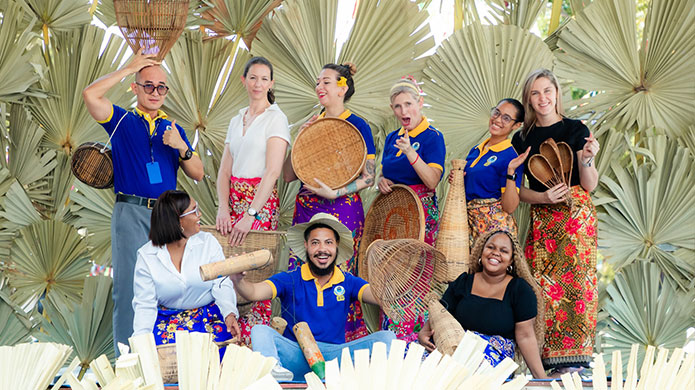
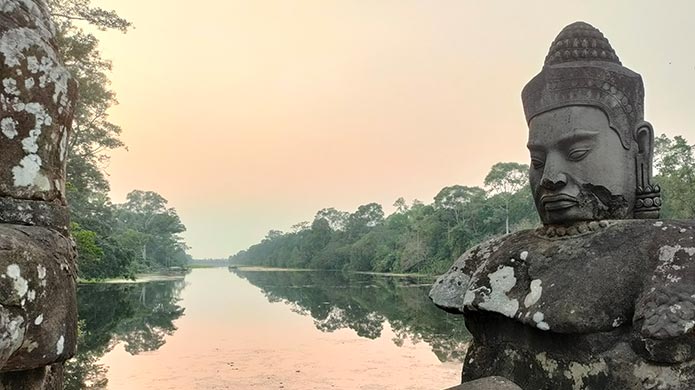
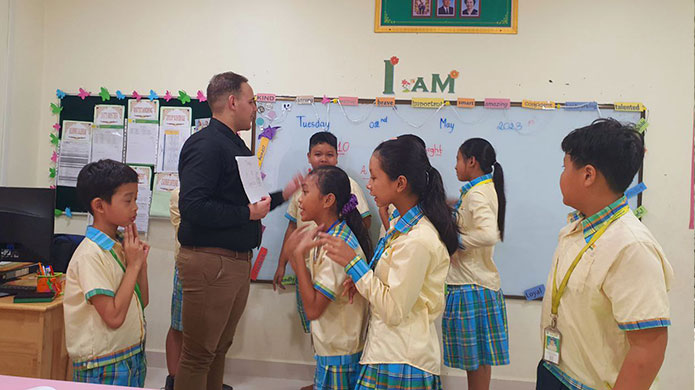

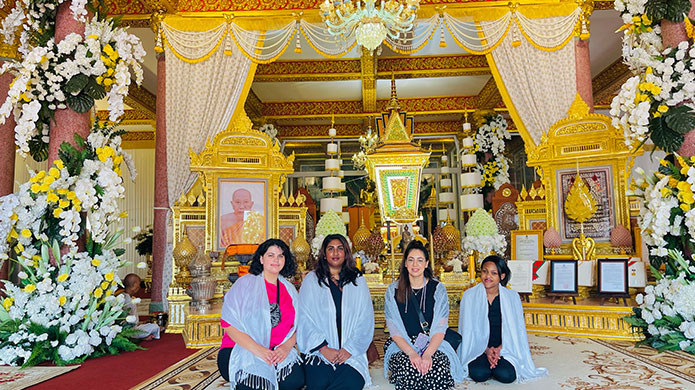
5 / 25
Teaching Placements
Teaching Placement Overview
| Salary range in USD per month | $900 - $1600 USD for degree holders* $700 - $1500 for non-degree holders * * May fluctuate due to exchange rate volatility. |
| Salary local currency per month | 2.8 - 6.1 million Riel |
| Saving potential in USD per month | $200 - $500+ |
| Employment Type | Full-time |
| Contract Length | 1 year |
| Placement Types | Private schools |
| Classroom Audience | Kindergarten, Primary (elementary and middle), High school students |
| Classroom Age | Between 4 - 12 |
| Classroom Size | 15-25 |
| Working Hours per week | 22 - 30 |
| Days off | 2 days per week but may not be consecutive |
| Holidays / Paid Leave | 18 days paid vacation and approximately 20 public holidays. |
| Tax rate range for teachers | 10-15% |
| Visa | Business Visa |
| Initial Enrollment to Arrival | 3 Months Minimum |
| Top Placement Locations | 1. Phnom Penh 2. Siem Reap 3. Krong Poi Pet 4. Battambang 5. Serei Saophoan |
Teaching Placements
English Teachers in Cambodia teach mainly in private schools.
Most people in Cambodia send their children to private schools as the quality of public-school education is very low.
There may also be limited language school classes.
Teaching Hours
Teaching hours differ between the two.
Language schools are busiest Saturday and Sunday so teachers work many classes on the weekends and then have time off during the week.
Private and international schools usually run Monday to Friday and so teachers work during the week and have the weekends off.
Note that for language schools teaching days vary from 5 to 6 days of teaching per week. If teaching 6 days per week, the teacher is given multiple paid vacation days to offset.
Teaching hours per week range from 22 to 30 or 4.5 to 6 hours of teaching per day.
Most positions are teaching young learners but there are also some high school positions.
It is important to note that teachers in Cambodia will be expected to teach other subjects through English, such as math, science, health, gym, art, etc. If asked to teach other subjects, these subjects would all be taught in English. If the school requires the teacher to teach another subject, this will be made known to the teacher when the interview opportunity is presented.
Schools provide an English teaching curriculum for teachers to follow.
Class sizes range from 15 to 25 students.
Salaries
You’ll earn within the range of $700 – $1,500 USD * for non degree holders
and $900 – $1,600 USD * for degree holders per month depending on your qualifications, experience and placement location.
This will comfortably cover your living expenses and weekend adventures due to the low cost of living.
General salary range:
- Non degree holders: $700 – $1500 *
- Degree holders: $900 – $1,600 *
* USD amounts may fluctuate due to exchange rate volatility.
Taxes
All participants will pay taxes in Cambodia of 10-15%.
Saving Potential
Saving potential depends strongly on your lifestyle and placement location, but on average the living expenses generally range from $100 – $200 USD.
Teaching Placement Locations
While every effort is made to match your placement requirements, we encourage you to approach your placement with an open mind and embrace the spirit of wanderlust as placements are contingent on available positions at the time of job assignment.
Phnom Penh
The city seamlessly merges contemporary comforts with the allure of ancient traditions.
Teachers will find well-equipped international schools, modern shopping malls, and quality healthcare readily accessible.
Explore its thriving art galleries, lively theaters, and museums brimming with historical artifacts.
Foodies rejoice! The city boasts an eclectic culinary landscape, from the tantalizing aromas of street food vendors to sophisticated fine-dining establishments.
Seek out the vibrant Riverside district for its buzzing nightlife, or unwind amidst the tranquility of lush parks and scenic cruises along the majestic Mekong River.
Siem Reap
Beyond the temples, discover a town brimming with life; explore bustling markets for handcrafted treasures, sample delicious Khmer cuisine, and connect with welcoming locals.
Seeking a rewarding teaching experience? Siem Reap boasts a variety of schools eager to welcome passionate educators.
When you’re not in the classroom, delve into Cambodia’s rich history at museums, unwind at charming cafes, or embark on weekend adventures to nearby waterfalls and floating villages.
Krong Poi Pet
This is a place where cultures collide, and the energy is palpable. While not your typical tourist destination, Krong Poi Pet pulsates with energy.
International schools here welcome dedicated teachers ready to embrace a challenge in a rapidly developing environment.
Explore the lively markets and sample diverse cuisines influenced by the border. Krong Poi Pet is your gateway to under-the-radar Cambodia, a place for bold educators seeking a truly unique experience.
Battambang
This riverside town exudes an artistic charm with its galleries, quirky cafes, and vibrant street art scene.
A growing number of schools provide the chance to make a tangible impact on eager students.
When it’s time to unwind, delve into Battambang’s rich history at its temples and museums, or embark on scenic bike rides through the picturesque countryside.
Enjoy slower evenings filled with delicious food at local markets and the chance to connect with a welcoming community – ideal for educators seeking a fulfilling and balanced life abroad.
Serei Saophoan
Engage with friendly locals in bustling markets, practicing your Khmer and discovering hidden gems.
Several schools cater to the growing community, offering a chance to connect deeply with students and contribute to their education.
After school, find relaxation exploring nearby temples, enjoying simple yet delicious local eateries, or witnessing the beauty of rural Cambodia with excursions into the surrounding countryside.
Serei Saophoan promises an authentic cultural immersion ideal for independent-minded educators seeking to discover the real Cambodia.
What if I am unhappy with my job? Can I be placed somewhere else?
If you are unhappy and there are clear reasons why the job is not working out for you, TravelBud will offer you placement assistance for a different job within our vetted school network.
That being said, we have strong relationships with our partner schools and our applicants are generally very happy with their placements.
We are also available 24/7 to fully support you and will check in with you throughout your teaching adventure.
What is the dress code for teaching English in Cambodia?
The dress code for English teachers is smart-casual. You are expected to look professional at all times when you are in the classroom bearing in mind that some schools may expect smarter clothing than others, so come prepared.
Here are some pointers:
- Skirt to the knee (Pencil or A-line, not too flowing) or smart trousers. Blouse that is not revealing. No sheer. No cleavage. Shoulders covered.
- Tattoos covered. Extra piercings removed.
- Collared shirts. Smart trousers. Closed Shoes (slip-ons are fine). Wear a tie to an interview if possible!
- Clean shaven or neat beard. Neat hair. Neat nails.
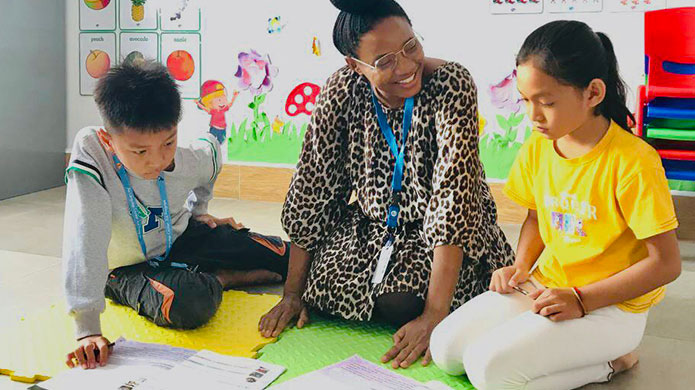
Over the past two decades, Cambodia has grown quickly, with increasing demand for English language education, leading to an influx of English teachers into the country, good teaching salaries, and high quality of life.
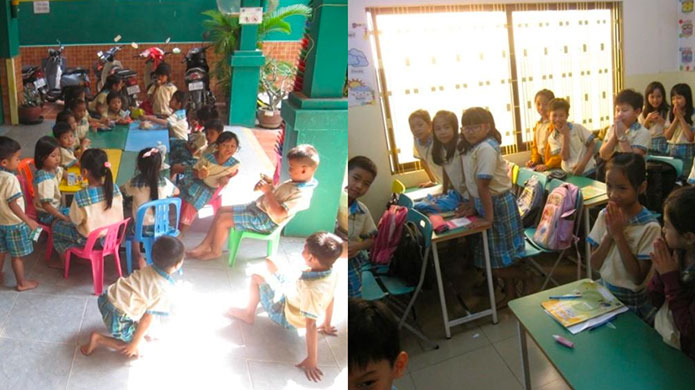
Schools provide an English teaching curriculum for teachers to follow. Class sizes range from 15 to 25 students.

In terms of placement locations, the vast majority of placements are in the capital city of Phnom Penh and in the second largest city of Siem Reap, home to Angkor Wat, one of the most majestic ancient cities in the world and a very popular tourist destination.
Guaranteed Job Placement
We find you a teaching job or jobs to ensure you have the maximum work hours allowed under your visa.
You could spend your own time trying to find your own teaching position.
But this can be time-consuming and stressful because you’ll have to wade through a myriad of risk factors and paperwork when evaluating teaching positions.
These can include but are not limited to:
- Work visas, relevant permits and documentation
- The interview process
- The credibility of the school
- Your safety at the school
- Understanding contracts, contract length and hidden clauses
- Payment terms and what happens in the event of non-payment
- Taxes
- Teaching philosophy and environment
- Teaching materials
- School code of conduct
- Local staff support and English proficiency
- After school activities and requirements
- Disciplinary processes
- And many more considerations!
So you might find a job but you’ll be unprepared from a teaching, cultural, financial and emotional perspective.
We take the pressure and stress away from you by guaranteeing job placement and providing peace of mind support.
- We guarantee you a teaching job in carefully vetted and trusted schools where every effort is made to match placement preferences.
- You can focus on enjoying your new lifestyle knowing your income of $700 – $1800 USD is secured.
- We’ll explain all the paperwork, contracts, taxes, work hours, requirements and responsibilities.
- We guide you through everything you need to know before you depart to Cambodia and from the moment you touch down, you’ll continue to receive peace of mind 24/7 support from our in-country team who will be on hand for you throughout your placement.
- We’ve all taught abroad before and, having placed over 2200+ participants around the world, know the key to success is well-trained, culturally-adjusted, and emotionally-supported teachers. Read more about our teaching placements.
Expert guidance and support
Our experts will explain the program and answer all your questions.
Lifetime Placement Assistance
Once you’ve taught in one of the TravelBud schools in Cambodia, we can assist you with positions at another partner school in any of our destinations for which you are eligible on your program line, at no additional charge to you.
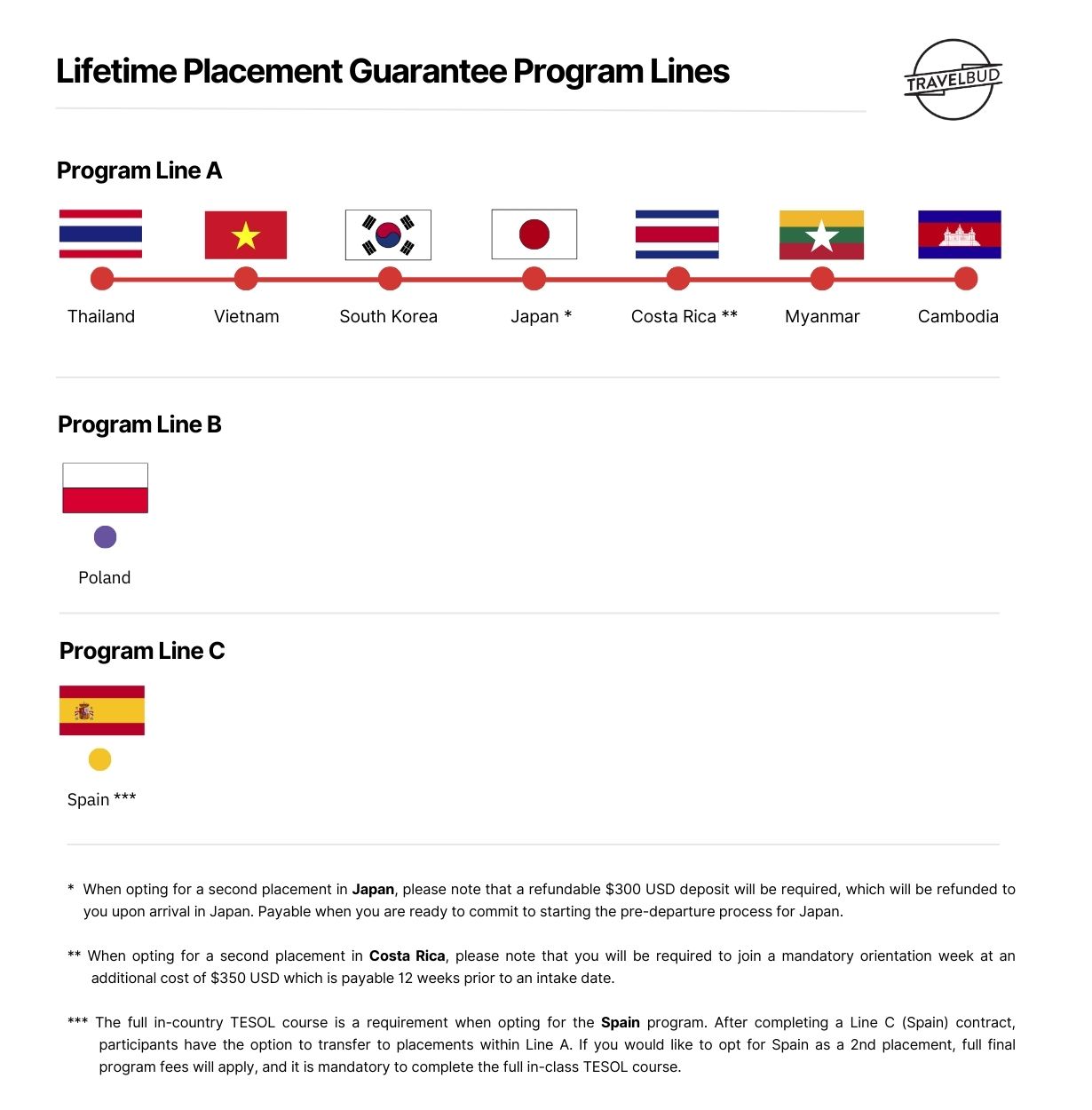
- Pay one fee and you’re able to teach in any partner school on your program line as long as you like.
- It’s a once-off fee for a lifetime of opportunities to make a difference in the lives of your students and travel the world in a sustainable way.
- For example, once you’re finished in Cambodia you can travel over to Vietnam and experience a whole new cultural adventure.
Fees
The following costs make up the program fee and are payable to TravelBud before you head over to Teach English in Cambodia.
Currency Converter
Change to your currency. Default prices in US Dollar (USD). Please take note that the amount reflected above is based on the current exchange rate and may fluctuate due to exchange rate volatility on the day of being invoiced.
Option 1In-Class TEFL in Thailand & Placement in Cambodia | Option 2Placement Only in Cambodia | ||
|---|---|---|---|
Enrollment Deposit |
|
|
|
| Comprehensive pre-departure support and guidance |
|
||
| Personalised one-on-one Support |
|
||
| Visa Guidance |
|
||
| Your questions answered |
|
||
Online TEFL Fee | Not applicable. | ||
Final Program Fee, Guaranteed Job Placement and 24/7 Support | $2200 | $1300 | Due 12 weeks prior to your selected intake date. |
| Guaranteed Job Placement |
|
||
| 24/7 In-country support |
|
||
| Lifetime Teaching Placement Guarantee |
|
||
| TEFL/TESOL Course | (4 weeks in Hua Hin, Thailand) |
|
|
| Internationally Accreditated Certification |
|
||
| Practical Teacher Training in-class |
|
||
| Airport pickup and transfer Subject to correct arrival times |
|
||
| Airport Assistance Info & guidance on trains/taxis/buses and routes | Not applicable. | ||
| SIM Card Included | No applicable | ||
| SIM Card guidance |
|
||
| Local bank account guidance |
|
||
| Shared Accommodation |
|
||
| Cultural Orientation including excursions | (1 week in Thailand, 1 week in Cambodia) | (1 week) | In-class TEFL participants experience:
|
| Lesson Plan templates and resource directories |
|
||
| Support Network |
|
||
| Self-development and advantageous future employability |
|
||
Total Fee | 120 Hour In-Class TEFL in Thailand & Placement in Cambodia$2799 | Placement Only$1899 | Default prices in US Dollar (USD). Please take note that currency converted pricing is based on the current exchange rate and may fluctuate due to exchange rate volatility on the day of being invoiced. |
Expert guidance and support
Our experts will explain the program and answer all your questions.
Frequently Asked Questions (FAQ)
What is the living expense per day?
It’s best to plan on around USD 10 per day living costs.
Do schools provide lunch?
Some do but not all. This will depend on each individual employer and their policy.
What is the cost of transport?
Taxis can range from 1-3 USD for a 15-30 minute trip. Motorbike taxi is roughly USD 1. Tuk Tuks are among the cheapest options for transport. There are also local two-row trucks that act as buses and will have a set route and can cost anywhere between 50 cents to USD 1 per trip. In the big cities, such as Phnom Penh and Siem Riep, there is also Grab taxi, which is like Uber.
Is transportation from my accommodation to work included?
Some schools will assist teachers with transportation but this is very rare. However, public transport is available.
How safe is it?
Like anywhere else it is recommended that you remain alert; however, Cambodia is a relatively safe place for both men and women to be alone.
What are the age groups I will be teaching?
Students range from kindergarten to high school. While we do try to meet individual preferences, we cannot guarantee that you will be placed with your first choice of age group.
What are the working hours? And days per week?
You should expect to be at school for 8 hours per day, but you will only have about 4-5 “in class” hours though. Private schools typically run from Monday to Friday. Language schools run in the afternoons and then full day Saturday and Sunday.
Are there sports after school that you have to attend or teach?
This will depend on your school. In most cases, teaching activities out with work hours is voluntary, however they do have concerts, cultural festivals and after school activities every now and again that you will be expected to attend.
After my contract can I still travel in the country or do I need to leave straight away?
You can stay as long as you like as long as you maintain a legal visa status.
Can I renew my working contract and visa without leaving the country?
It’s possible but it depends on the situation. Worst case scenario, you just do a quick border bounce and come back on a visa exemption and then your new school can transfer you over to the work permit.
How long is the working visa valid for?
It depends. Typically, 6 months or 1 year depending on length of contract.
What type of visa will I be arriving on?
You will be arriving either on tourist visa exemption, otherwise known as a visa on arrival, or a business visa on arrival.
Are there organized activities during evenings and weekends?
We holds meet-ups for teachers at different throughout the year. These meet ups are a great way to meet up with old friends and meet new people who are in your area.
Will I receive any language lessons? How will I understand my students?
During your orientation week and TESOL course, you will have several Cambodia language lessons to get you started. One of the key things to remember in your classroom is to gesture your directions. You may find that your students have a lower proficiency of English than you were expecting, but overtime you will learn to communicate with your students and colleagues.
Where is the best place to work?
This will differ from person to person. There are no bad places to work as every person has their own preferences. We find that there are tremendous benefits to working in both rural and urban areas.
What is the possibility of a second job to make more money?
Many of our teachers take on extra work to build up their monthly income. In some cases, people are able to double their income with extra work on the side. This can be negotiated through your employer or done privately and usually for English tuition.
How are the authorities?
The authorities are genuinely helpful and professional. They should be treated with respect as in your own home country.
Medical services and insurance?
We require that participants be fully insured in Cambodia with travel insurance for the duration of their stay. This must be arranged prior to as obtaining insurance once you have left your home country can be difficult and expensive. The insurance that schools may provide is too basic to provide good quality medical care.
What is phone and Internet connectivity like?
WIFI can be spotty all over Cambodia so we recommend getting a larger data plan on your phone in case you need to hot spot your other devices. Phone connectivity is really good and cheap and there are many places to assist you with this process. We will provide you with a SIM card upon arrival and will help get you up and running within the first two days of the course.
Can non-native speakers participate in the course and placement?
At this time, we only allow participants from native English-speaking Western countries.
What if you are unhappy in a job? Can you get a new one?
Yes, but we don’t often find this to be a problem. If the applicant really dislikes the job and they have a good reason, then we can help move them. But they need to understand that this can take time, and we ask that they be patient and flexible.
What is the dress code for teaching?
Men are expected to wear smart trousers and a collared shirt. Depending on the school you may also be required to wear a tie. Women are expected to where a skirt and a smart shirt or blouse or a dress. Some schools may permit women to wear trousers. The dress code varies depending on the school but you should plan to dress to impress.
How difficult is the TESOL course? Can I fail?
Yes, you can fail. However, our staff continuously monitoring applicant’s progress and should they feel that an applicant requires additional support it will be offered to them to ensure that they are able to pass the course.
Must the teachers have CV’s?
Yes. Your CV should be added to the template and sent to us ahead of your arrival in Cambodia.
Are there any serious laws they are very strict on?
Cambodia has a zero tolerance on drug possession and speaking negatively about the government.
Can couples be placed together?
This can be done, but not always at the same school. The schools may be within the same town. For participants travelling in couples or friends, they need to be extremely flexible and open to placement location.
What is the level of English and behavior of students?
This will vary city to city; however, there is typically beginner knowledge of English throughout the country. Thai students are generally well behaved.
What curriculum will they follow at school?
There is no set curriculum; each school will have their own curriculum and procedures. Teachers should be aware they most likely will be asked to teach multiple subjects, all in English.
Will my colleagues speak English?
Yes. Sometimes only limited English though.
Will I work with any special needs children?
Yes, probably, but they won’t necessarily be classified as such. They will just be in your normal classes.
What are the chances of schools deducting security money? And how does this work?
Schools may sometimes hold a small portion of salary in escrow until the end of the contract to dissuade teachers from leaving in the middle of a school term. This is, however, a rare policy.
What are the expected deductions from your paycheck? Does is differ from school to school?
The tax rate is approximately 20% for teachers in the first 6 months in Cambodia, and then lowers to the residence rate around 5% in the second 6 months and beyond.
Will I get paid overtime?
No.
What are the chances of getting a salary increase?
If you do a good job there is potential to get a pay rise or a resigning bonus.
What are the chances of teaching English in neighboring countries?
We works with several other countries in Asia and we can help participants who are interested in teaching elsewhere get started.
Is all paperwork and books supplied by the school?
Yes, most of the time, but not all the time.
When are the school holidays?
There are many public holidays throughout the year. school holidays are not long as these are private and language schools
What is the big difference between language schools, private schools, government schools and varsity?
Starting times and salaries vary. Also, they have different holidays. Language schools typically do not have long holidays.
Can participant choose part or full time?
All positions are full time.
Is religion a big issue?
No, however it is important to be respectful at all times of other religions.
What happens if you lose your job? Can you get a new one?
If you are fired due to poor conduct, we will no longer help with placement.
Are you expected to work during school holidays?
Not normally, however your school may ask you to participate in an English camp or activities camp
of some kind.
Can you drink tap water?
It is recommended not to drink the tap water, as there can be bacteria our bodies are unfamiliar with.
Bottled water is cheap and it’s safer to go buy a bottle. But if you happen to get a mouth full brushing
your teeth, etc., there’s no need for concern.
How does setting up the local bank account work?
Once you get placed with a school, the school will transfer you’re visa from a visa on arrival to a
business visa. With that new business visa and rental contract, opening a bank account is easy. Just
take your rental contract and visa to a local bank. We will stand by to assist and provides a step-
by-step guide on opening a bank account once you have the documents and visa ready. The fee to set
up a bank account is USD 15.
We’re here to help
We’ll answer all your questions and guide you every step of the way!